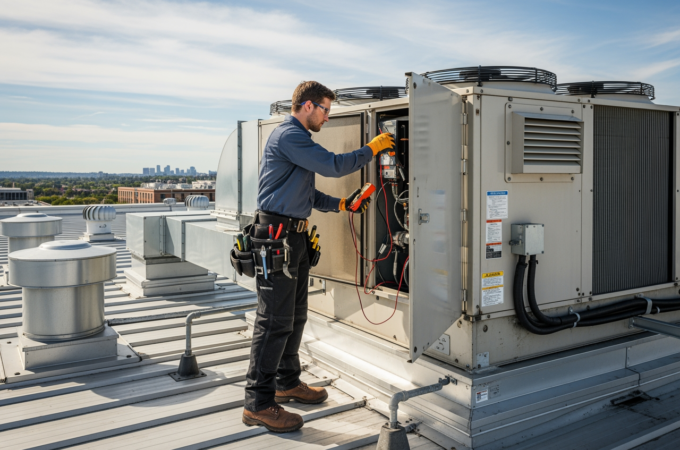
Clever Home Maintenance Tips for Modern Homeowners
Table of Contents
ToggleKey Takeaways
- Proactive maintenance helps avoid expensive emergencies and prolongs home life by catching problems early.
- Utilizing simple hacks and modern technology can significantly boost efficiency and comfort.
- Creating and sticking to a maintenance budget is vital for preparedness and peace of mind.
Proper home maintenance isn’t just about tackling issues as they arise—it’s also about streamlining your approach with practical, repeatable strategies. Your well-planned maintenance efforts will safeguard your property’s value and result in a higher quality of daily life, more efficient use of energy, and even boost your home’s eventual resale price. Learning clever ways to simplify maintenance reduces stress and provides more time for the things you love. In this helpful guide, you’ll discover eight tips every homeowner should know, including easy-to-implement ideas and opportunities for using the latest technology. By being organized and proactive, modern homeowners can prevent unwelcome surprises, preserve the condition and appearance of their properties, and enjoy a worry-free home environment.
Maintaining a home in today’s fast-paced world requires a thoughtful blend of traditional practices and innovative modern solutions. Busy schedules often leave homeowners pressed for time, but smart, proactive maintenance can protect both comfort and long-term investments. Savvy homeowners know that prevention is far more effective—and much less expensive—than repairing major problems after they arise. Whether it’s keeping up with basic repairs, leveraging new technologies, or planning, clever maintenance ensures your living space remains welcoming and efficient. For example, addressing small repairs before they become emergencies—like scheduling proactive St. Paul garage door repair—can keep your home safe, secure, and save you from large future bills. Overall, making a habit of regular checks and necessary upgrades is a smart approach for any homeowner striving for peace of mind.
Regular Roof Inspections
The roof is your first and most important barrier against the elements, reliably shielding your property from wind, rain, snow, and sun. Over time, harsh weather can cause serious wear, even if damage isn’t immediately noticeable. To prevent leaks and costly structural damage, conduct thorough roof inspections at least twice a year—preferably in spring and fall—before the most severe weather hits. When inspecting, look for missing, warped, broken, or loose shingles and rusted or damaged flashing around chimneys or skylights. It’s also essential to monitor your attic and upper ceilings for discoloration or water stains, which could indicate slow-developing leaks. If you see signs of moss, algae, or heavy debris buildup, tackle these issues promptly since moisture can accelerate roof deterioration. Addressing small problems before they grow can save you time, money, and future stress, ensuring your home stays dry and secure for years.
HVAC System Maintenance
A well-maintained HVAC system is essential for comfort and cost-effective energy use throughout the year. Regular upkeep keeps your home warm in winter, cool in summer, and ensures healthy air quality for your family and guests. Changing your HVAC air filters every one to three months is a simple but powerful step, reducing energy waste and air pollution. Annual tune-ups, performed by a certified technician, will check key components like the compressor, fan, coils, and thermostat. This routine servicing improves indoor air quality by catching dust and allergens and extends the lifespan of your entire HVAC system, helping you avoid expensive emergency repairs in the middle of a heat wave or cold snap. In addition, periodic cleaning of air vents and ductwork helps preserve efficient airflow, cutting utility bills and reducing allergens—particularly important in homes with pets or family members who suffer from allergies.
Gutter Cleaning
Gutters are easy to overlook, yet they play a critical role in protecting your home’s structure by channeling rainwater away from foundations and other sensitive areas. When gutters become clogged with leaves, twigs, dirt, and other debris, water may overflow, leading to soil erosion, basement flooding, or even damaged siding. For best results, thoroughly clean your gutters at least twice yearly: ideally once in late spring after pollen and seed drop, and again in late fall after leaves have shed. If trees surround your home, be prepared to clean gutters more often or after heavy storms. Confirm that all downspouts are clear and direct water at least five feet away from your foundation to minimize flooding risks. For added convenience and prevention, consider installing gutter guards or mesh screens to reduce blockages and simplify future cleanings. These straightforward steps can preserve your property’s structural integrity and help you avoid messy, expensive repairs caused by unchecked water damage.
Seal Windows and Doors
Cracks, gaps, or poor weatherstripping around your home’s windows and doors can allow air leaks, leading to higher energy bills, uncomfortable drafts, and even the entry of insects and dust. Especially in older homes, weather changes, settling foundations, and regular use can widen small gaps, making heating and cooling work harder and less efficiently. To detect leaks, hold a lit incense stick or piece of tissue near the window and door frames; any movement detected by air currents signals the need for new seals. You can significantly increase your home’s energy efficiency by applying high-quality weatherstripping or caulk to these vulnerable areas. Not only will your rooms stay warmer in winter and cooler in summer, but you’ll also prevent allergens and unwelcome critters from getting inside. Sealing up these gaps is one of the simplest and most cost-effective ways to increase overall comfort and cleanliness in your living spaces while controlling utility bills.
Lawn and Landscaping Maintenance
Well-kept landscaping is about more than looks—it directly impacts your home’s value, deters pests, and helps control erosion. Consistent lawn care supports robust root systems and lush green lawns, such as regular mowing, watering deeply but not too frequently, and using the right fertilizer for your grass type. Prune trees and shrubs every season, cutting back any branches growing too close to your home, roof, or utility lines—overgrown trees can scratch siding, block gutters, and even serve as pathways for rodents or insects to enter your home. Pay close attention to the overall health of your plants: yellowing leaves, unusual growth, or signs of fungus can all signal bigger problems. Addressing small landscaping issues before they snowball protects your investment while keeping your property healthy, beautiful, and inviting throughout the year.
Electrical System Check
Maintaining your home’s electrical system is essential for convenience and family safety, as electrical malfunctions are a leading cause of residential fires. Every few months, carry out a visual inspection of outlets, extension cords, and electrical panels for any signs of scorching, fraying, or unusual heat. If you notice flickering lights, outlets that feel warm to the touch, frequent circuit breaker trips, or hear buzzing sounds from outlets or panels, these are all red flags that may indicate serious underlying issues. Never attempt complex electrical repairs, as this can be extremely risky; always rely on a licensed electrician for upgrades or troubleshooting. Scheduling professional inspections every few years ensures your home wiring and systems remain reliable and up to code. Taking these precautions will help keep your home functioning and your loved ones protected.
Smart Home Monitoring
Modern technology has revolutionized homeownership by making monitoring and maintaining a safe, comfortable home environment easier than ever. Installing smart devices, such as Wi-Fi-enabled security cameras, remote-controlled thermostats, water leak detectors, and smart smoke alarms, allows you to track essential systems and receive instant alerts on your smartphone—no matter where you are. These helpful devices automatically detect issues, like a water leak under the sink or an open door, enabling quick action and eliminating guesswork. Smart home systems can also automate daily routines—turning lights off, adjusting climate control to save energy, or keeping a watchful eye when you’re on vacation. By embracing smart home solutions, homeowners gain added convenience, improved security, and valuable peace of mind, turning their homes into truly modern, responsive spaces.
Budgeting for Maintenance
Smart financial planning is the backbone of effective home maintenance. Setting aside dedicated funds for repairs and routine upkeep ensures you’re always prepared for scheduled tasks and unforeseen emergencies. Experts often recommend saving at least one percent of your home’s total value yearly, specifically for maintenance and potential repairs. However, adjust this amount if your home is older or has unique features requiring special care. Track ongoing costs and upcoming projects using a spreadsheet, notebook, or budgeting app to avoid overspending. Staying financially organized brings peace of mind and prevents major, surprise expenses from derailing other financial priorities or goals.
With these clever home maintenance strategies, your property can thrive as a comfortable, efficient, and beautiful sanctuary for years. Thoughtful, routine upkeep—from regular roof inspections to smart-home upgrades—provides immediate benefits, energy savings, greater comfort, and crucial protection for your investment. Investing a little time and effort today results in fewer headaches, lower expenses, and a worry-free lifestyle in your modern home.





